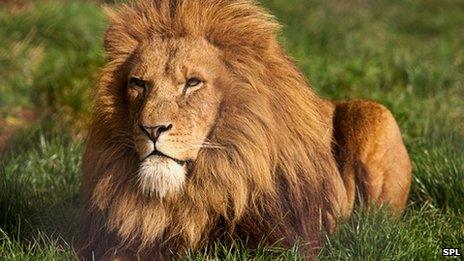Fencing off wild lions from humans 'could save them'
- Published

Roam free? Conservationists have argued that keeping the lions behind fences could safeguard their future
Nearly half of Africa's wild lions are facing extinction in 20 to 40 years unless urgent conservation measures are put in place, a report suggests.
Writing in the journal, external Ecology Letters, conservationists have said that the big cats should be better protected from their main threat - humans.
They have proposed that fencing off the carnivores into nature reserves could protect them in the future.
The scheme would be expensive, costing about $500 (£300) per square kilometre.
But the authors of the paper said it would be more cost effective than some of the current projects that encourage humans to live alongside these animals.
Physical barriers
Africa's lions have suffered dramatic declines over the last 50 years.
Their numbers are estimated to have fallen by about 80% - and recent surveys suggest there could be as few as 20,000 to 30,000 of the big cats left in the wild.
Much of this loss has been blamed on humans.
Some of the big cats have been killed because they are perceived to be a threat to livestock, and competition for land and over-hunting of their prey have reduced their numbers even further.
Now conservationists have argued that separating wild lions from humans could be their only hope of survival.
They said that fencing off reserves in areas such as the Serengeti and South Africa's National Parks has helped the populations to grow, and now propose extending these schemes across Africa.
They say conserving wild lions in unfenced areas costs $2,000 (£1,300) per square kilometre, compared with an estimated $500 for the same efforts in enclosed regions.
The lead author of the paper Craig Packer, an ecologist from the University of Minnesota, said: "It is clear that fences work and unfenced populations are extremely expensive to maintain."
Managing wild animals in this way is an extreme measure, but conservationists are arguing that radical schemes are needed to save species from extinction.
Dr Luke Hunter, from the big cat conservation organisation Panthera, said: "No one wants to resort to putting any more fences around Africa's marvellous wild areas, but without massive and immediate increases in the commitment to lion conservation, we may have little choice."
- Published5 December 2012
- Published10 January 2013
- Published7 July 2012
- Published23 March 2011